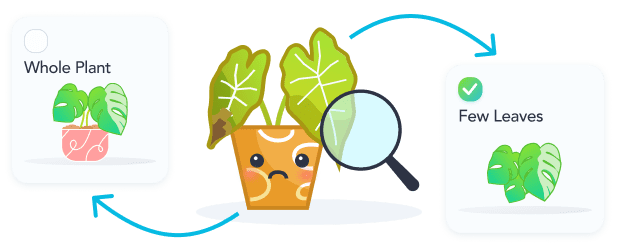Care Guides for Song Of India Plant
Every 7d
Recommended Frequency
1 /2 cup of water
Recommended Amount
Caring for a Song of India plant (Dracaena reflexa) involves understanding its watering needs to keep it thriving. Typically, watering every 1-2 weeks is sufficient, allowing the soil to dry out slightly between watering...
Every 14d
Recommended Frequency
Caring for your Song of India plant involves a specific fertilization routine to maintain its vibrant foliage and overall health. During the growing seasons of spring and summer, it is recommended to fertilize this plant...
Indirect Sun
Recommended
The Song of India plant thrives in bright, indirect light. It is best positioned about 5 feet away from a southern or western-facing window. This placement allows it to receive a gentle touch of direct sunlight for no mo...
Every 730d
Recommended Frequency
As a professional botanist, I'd like to guide you through the process of repotting your Song of India plant, a crucial aspect of its care to ensure its continued health and growth. The Song of India plant, known for its ...
The Song of India plant thrives best in a temperature range that can be considered on the warmer side. Ideally, maintaining an environment between 75 to 85 degrees Fahrenheit will promote healthy growth and vibrant folia...
Recommended Soil
For the Song of India plant (Dracaena reflexa), the recommended soil type is loamy soil. This soil is well-draining and fertile, making it ideal for this particular plant. Loamy soil consists of equal parts sand, silt, a...
Caring for a Song of India plant (Dracaena reflexa) involves understanding its humidity needs, which are crucial for its health and growth. This plant thrives in environments where the humidity ranges from 40% to 80%, av...
Questions about Song Of India Plant
The Song of India plant, scientifically known as Dracaena reflexa, is a popular houseplant known for its striking variegated leaves that feature green centers with light yellow or cream edges. It thrives in bright, indir...

Toxicity of Song Of India Plant

Common Pests and Diseases
Root Rot
Overwatering
To address root rot, first, stop watering the plant and allow the soil to dry out. If the plant is severely affected, remove it from its pot and trim away any black, mushy roots, leaving only healthy, white roots. Repot the plant in fresh, well-draining soil and a clean pot. Ensure the pot has adequate drainage holes. Going forward, water the plant only when the top inch of soil feels dry to the touch, avoiding waterlogging.
Leaf Spot Disease
Fungal or bacterial pathogens
To manage leaf spot disease, it's crucial to maintain a clean environment around your Song of India plant. Remove and dispose of any infected leaves to prevent the spread of the disease. Improve air circulation around the plant to reduce humidity levels, which can exacerbate the problem. If the infection is severe, applying a fungicide or bactericide, as appropriate, according to the product's instructions, can help control the disease. Always ensure the plant is not stressed by environmental factors, as a healthy plant is more resistant to diseases.

Related Plants














